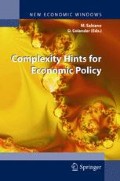Abstract
We set up agent based models in which agents have low or zero cognitive ability. We examine two quite diverse socio-economic phenomena, namely the distribution of the cumulative size of economic recessions in the United States and the distribution of the number of crimes carried out by individuals. We show that the key macro-phenomena of the two systems can be shown to emerge from the behaviour of these agents. In other words, both the distribution of economic recessions and the distribution of the number of crimes can be accounted for by models in which agents have low or zero cognitive ability.
Access this chapter
Tax calculation will be finalised at checkout
Purchases are for personal use only
Preview
Unable to display preview. Download preview PDF.
References
Albert, R., and A. Barabasi (2002): Statistical mechanics of complex networks, Rev. Mod. Physics, Vol. 74, pp. 47–97.
Colbaugh, R., and K. Glass (2003): Information extraction in complex systems, Proc. 2003 NAACSOS Conference, Pittsburgh, PA, June (plenary talk).
Colbaugh, R., and K. Glass (2004): Simple models for complex social systems, Technical Report, U.S. Department of Defense, February.
Cook W., P. Ormerod, and E. Cooper (2004): Scaling behaviour in the number of criminal acts committed by individuals, Journal of Statistical Mechanics: Theory and Experiment, 2004, P07003.
Kahneman, D. (2002): Nobel Foundation interview, http://www.nobel.se/economics/laureates/2002/khaneman-interview.html
Newman, M. (2003): The structure and function of complex networks, SIAM Review, Vol. 45, No. 2, pp. 167–256.
Ormerod, P. (2002): The US business cycle: power law scaling for interacting units with complex internal structure, Physica A, 314, pp.774–785.
Ormerod, P. (2004): Information cascades and the distribution of economic recessions in capitalist economies, Physica A, 341, 556–568, 2004
Ormerod, P., and B. Rosewell (2003): What can firms know? Proc. 2003 NAACSOS Conference, Pittsburgh, PA, June (plenary talk).
Radner, R. (1968): Competitive Equilibrium Under Uncertainty, Econometrica, 36.
Smith, V. L. (2003): Constructivist and ecological rationality in economics, American Economic Review, 93, pp. 465–508.
Author information
Authors and Affiliations
Rights and permissions
Copyright information
© 2007 Springer-Verlag Italia
About this chapter
Cite this chapter
Ormerod, P., Trabatti, M., Glass, K., Colbaugh, R. (2007). Explaining Social and Economic Phenomena by Models with Low or Zero Cognition Agents. In: Complexity Hints for Economic Policy. New Economic Windows. Springer, Milano. https://doi.org/10.1007/978-88-470-0534-1_10
Download citation
DOI: https://doi.org/10.1007/978-88-470-0534-1_10
Publisher Name: Springer, Milano
Print ISBN: 978-88-470-0533-4
Online ISBN: 978-88-470-0534-1
eBook Packages: Business and EconomicsEconomics and Finance (R0)

